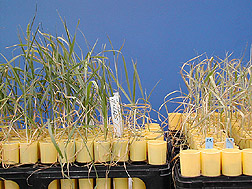Marie Louise Lévêque de Vilmorin was a French novelist, poet and journalist.

Scaramouche is an historical novel by Rafael Sabatini, originally published in 1921. A romantic adventure, Scaramouche tells the story of a young lawyer during the French Revolution. In the course of his adventures he becomes an actor portraying "Scaramouche". He also becomes a revolutionary, politician, and fencing-master, confounding his enemies with his powerful orations and swordsmanship. He is forced by circumstances to change sides several times. The book also depicts his transformation from cynic to idealist.
Cyril Dean Darlington FRS was an English biologist, geneticist and eugenicist, who discovered the mechanics of chromosomal crossover, its role in inheritance, and therefore its importance to evolution. He was Sherardian Professor of Botany at the University of Oxford from 1953 to 1971.
André Marcel Lévêque was a French engineer, famous for his work on heat transfer.

Jean Claude Pernet, père was a French rosarian known for his cultivation of rose cultivars. He was born to a family of rose growers in Villeurbanne, Rhône, near the city of Lyon. His father, Claude Pernet, established a rose nursery in 1845.

Scaramouche (1923) is a silent costume adventure based on the novel Scaramouche by Rafael Sabatini, directed by Rex Ingram, released by Metro Pictures, and starring Ramón Novarro, Alice Terry, Lewis Stone, and Lloyd Ingraham.
Events from the year 1902 in France.
The Arboretum Vilmorin is a private arboretum located at 2 rue d'Estienne d'Orves, Verrières-le-Buisson, Essonne, Île-de-France, France. It is open by appointment only. A newer portion of the family arboretum was acquired by the municipality in 1975, and is now open to the public as the Arboretum municipal de Verrières-le-Buisson.

The Arboretum national des Barres is a national arboretum located in Nogent-sur-Vernisson, Loiret, Centre-Val de Loire, France. It is open daily in the warmer months; an admission fee is charged. Closure is planned for the end of year 2018 because subsidy from local and national government is too short.

Joseph-Marie-Philippe Lévêque de Vilmorin, generally known as Philippe de Vilmorin, was a noted French botanist and plant collector, and a member of the celebrated Vilmorin family of horticulturists.

Vilmorin is a French seed producer. The company has a long history in France, where it was family-controlled for almost two centuries, and today exists as a publicly traded company owned principally by agro-industrial cooperative Groupe Limagrain, the largest plant breeding and seed company in the European Union.

KWS SAAT SE is a European independent and family-owned company based in Germany that focuses on plant breeding, with activities in about 70 countries. KWS is the fifth largest seed producer worldwide based on sales. The product range includes seed varieties for sugar beet, corn, cereals, rapeseed and potatoes. The capital letters "K," "W" and "S" in the name KWS stand for Klein Wanzlebener Saatzucht, which means seed breeding from Klein Wanzleben. The company’s original headquarters were in Klein Wanzleben, an East German town located near the city of Magdeburg. Its main markets are in the temperate climate zones of Europe, North and South America as well as North Africa and Asia. KWS has a network of more than 30 breeding stations, 130 testing stations and around 60 subsidiaries. In 1954, the company went public on the Hamburg-Hannover Stock Exchange and has been on the SDAX list of the Frankfurt Stock Exchange since June 2006.

Charles Henry Philippe Lévêque de Vilmorin was a French botanist, the son of Pierre François "Louis" Lévêque de Vilmorin (1816-1860) and Elisa Bailly (1826-1868), and grandfather of the novelist, poet and journalist, Louise de Vilmorin. Seven generations of the family of Vilmorin contributed greatly to French agriculture for over two hundred and thirty years by their improvements of sugar-beet and wheat - they published more than three hundred and sixty articles on plants in agriculture, horticulture, floriculture and botany.
Johannes Groenland was a German botanist, horticulturist, and microscopist. He was born April 8, 1824 in Altona, a borough of Hamburg that was part of the Duchy of Holstein at that time. He was the son of Johann Friedrich Grönland, a German organist and music teacher. Groenland was trained in pharmacology in his youth and served as a pharmacist in Altona, Hamburg, and Jena in his early 20s. In 1849 he joined the Schleswig-Holstein army to fight in the First Schleswig War. After the war, Groenland moved to Paris to work as an assistant to Louis de Vilmorin, a French biologist and horticulturist who was also a member of the family firm Vilmorin-Andrieux. While working for Vilmorin, Groenland worked with Theodor Rümpler to prepare the German edition of Les fleurs de pleine terre.
The Société botanique de France (SBF) is a French learned society founded on 24 May 1854. At its inaugural meeting it stated its purpose as "to contribute to the progress of botany and related sciences and to facilitate, by all means at its disposal, the education and the work of its members".
Christian Carl André (1763-1831) was a leading 19th century European natural scientist, publisher, economist and educator. He was among the pioneers in the study of heredity whose vision paved the way for the research of Gregor Mendel, the founder of modern genetics.
Elisa Bailly de Vilmorin was a French horticulturist and plant breeder. She was married to Louis de Vilmorin.
Pierre-Louis or Pierre Louis may refer to:











